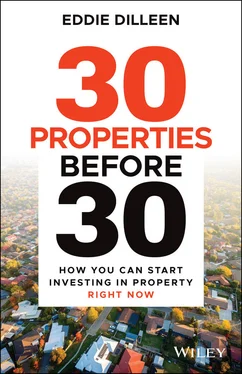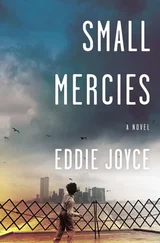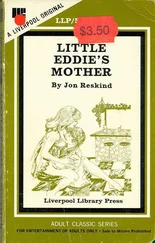Being constantly short of money caused a lot of stress for Mum, who was trying her best to provide for her family. We relied on government assistance and food stamps to ensure we could eat. I might have been a rebel in school, but if someone threw 20 cents on the ground, I picked it up.
It wasn't fun living with the constant stress of break-ins, fires and violent people on the streets, but we just had to deal with it — it was how we lived. I watched as kids from school or the neighbourhood would be drawn into the same cycle of poverty as their parents before them, falling into the traps of drug abuse, drinking, crime and welfare dependency.
My response to this experience was a bit different from most kids'. Growing up in poverty definitely made me more financially aware than most. You need money to survive. You can't buy food without it. I didn't want to end up on the dole and just continue living hand to mouth like everyone around me. I didn't want to be stuck in this shitty cycle forever. For me, how we were living was all wrong. And the thought that one day my own kids might be stuck in the same rut was even worse. So how could I fix the situation?
I started asking questions about money and property at age seven. We'd go to church, then visit one of Mum's friends in Baulkham Hills, Castle Hill, a nice area in the hill district of western Sydney. I remember they had a big flat-screen TV when they had just come out. I was blown away. They had all kinds of nice stuff in a really nice house, and the drive home from their house to ours left a deep impression on me. We'd drive from an area of big, beautiful, family-friendly homes with manicured lawns towards shabbier and shabbier houses and front yards, until we'd pass a house someone had set on fire. I remember that so clearly. And the neighbourhoods had completely different atmospheres. I knew where I wanted to be.
Visiting these people, I became obsessed with the idea of a different life. I told myself that one day I'd own one of those nice houses. I was determined that when I grew up I would make enough money so I'd never have to worry about it again.
When I was a teenager and started getting more interested in property, I realised that people who create wealth and live in nice areas usually own their home, and some owned investment properties too. At the very least they had steady jobs. No one in our family owned any property. They'd worked for 30, 40, 50 years, and still hadn't been able to lift themselves out of the same rough neighbourhood. I knew I couldn't do that. I had to do something different.
I should note that I felt more mature than other kids my age. At 12 years old I didn't feel like a child. By around age 13 or 14, I recognised that some of the financial decisions made by my parents weren't good decisions, and I knew I wanted to do something different. I felt like I was growing up really fast because I had to parent myself to some degree. I was probably a difficult teen. I don't know if I was rebellious exactly, but I thought I knew better than my mum did.
I certainly got into a lot of trouble in high school. I went to a very rough school that was infamous in western Sydney and beyond, not least for a TV documentary, Plumpton High Babies, that was filmed there. We had day care so girls as young as 14 or 15 could bring their babies to school. The school was the best my mum could manage, but I knew I wanted a very different future for myself and for my own kids one day. Because my family and close friends never went to university, that wasn't on my radar. I thought university or college happened only in America.
As a teenager, I would go visit my father a few times a year. He lived in the Adelaide suburb of Glenelg. When I stayed with him, he would spend a lot of time reading the paper and checking on the stocks he owned. It gave me an interest in stocks, and I did try them at one point (which I cover later). When I was 18, Dad was already 63 years old and had contracted cancer. He passed away at 71 years old, when I was 26. It was heartbreaking losing him so young. He died with no financial assets to his name, no properties, no stocks of significant value — they'd all been used up paying for his retirement and medical bills. For me, this reinforced the fact that a person could work extremely hard their entire life and still be struggling financially right to the end.
It was a hard, deeply sad lesson that only added fuel to my fire. I was determined to make money work better for me so I could create financial security and wealth over time.
At 14, I started working after school at KFC to help bring in some extra money, and by 16 I had switched over to McDonald's. Everybody starts somewhere, and these jobs worked well around my school hours and gave me some pocket money.
It was during my time at McDonald's that my interest in property really began to take off. A 19-year-old workmate happened to mention that he had just bought his first investment property with the help of his dad. It blew me away. How had this guy only three years older than me managed to buy a property when none of my family members or friends, or indeed anyone I knew, had managed it? If he could do it, why couldn't I? My goal of owning a home suddenly started to look achievable.
When I was 17 years old, working long shifts at McDonald's for less than $11 an hour, I would imagine where I would be financially 10 or 15 years down the track. I was certain I didn't want to keep struggling. I remember thinking, How can I make sure I'm financially set up when I'm 30 years old? What can I do in the next few years that will put me ahead of everyone else? As a start, I made sure I saved as much as I could. I was saving at least $200 to $250 a week out of my part-time wage of $340.
One morning I was working a very early morning shift at McDonald's with another crew member, Steve. We were doing the open shift, which means opening up the store, turning on all the equipment and getting the cooking area of the restaurant ready for preparing the breakfast food. Steve was complaining about money and how tired he was of working at Macca's — in a couple months he would have been there 10 years, and he was turning 28 years old.
I said, ‘Steve, why don't you just quit here and apply for other jobs that pay more, or something you'd enjoy more?’
I still remember his reply: ‘I can't quit, I don't have enough money to pay my rent, bills and car loan. And I don't have the time to look for other jobs or go to interviews because I'm always working.’
‘But you have some money saved from working here for 10 years though, right? You have the nicest car!’ I said, trying to make him feel better. ‘You could just sell that if you needed money?’ He was a car fanatic and always loved talking about his car.
‘I barely have any savings. My wage goes out as fast as it comes in. I've got my car loan to pay off too! That's almost $30 000. I thought about selling the car to get rid of my loan, but I won't even get $15 000 for it now.
‘Never buy an expensive, brand-new car’, he added. ‘It's one of my biggest regrets. The bank charges huge interest, then after five years or so the car's not even worth half of what you paid! The car goes down in value and you can't even get your money back if you want to sell it in a few years' time.’
I could hear the regret in his voice. He knew he'd made a mistake that would cost him dearly for years.
Like Steve, many of my friends had started taking out personal loans to buy nice cars on finance. The temptation to do the same was strong. I had always wanted an old Ford Mustang and was close to dropping all my savings on the car of my dreams. Luckily, thanks to Steve's well-timed advice, common sense prevailed and I managed to resist the temptation.
Читать дальше












